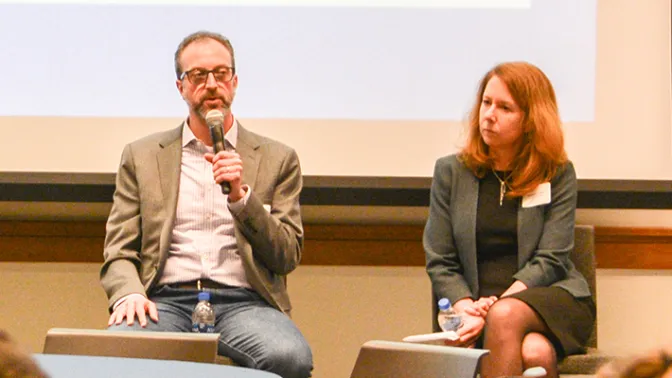Consider These Leading-Edge LeBow Courses for Winter Term 2022
Winter term registration is now open for undergraduate and graduate students! Whether you’re looking to fulfill elective requirements in your major or learn about a new subject — from supply chain operations to the cannabis industry — LeBow’s winter term courses explore the most current trends and critical questions in the business world.
Department of Accounting
ACCT 415: Tax Experiential Learning, taught by Barbara Grein, PhD, associate professor and department head of accounting
In this experiential service-learning class, participate in Volunteer Income Tax Assistance (VITA), a nationally recognized program supported by the IRS. Complete a short IRS training program and then prepare actual individual income tax returns to help those in need of pro bono assistance in the Philadelphia community through a neighborhood service project. Build critical skills working with clients to build their trust and explain accounting and tax concepts, working as part of a team and with tax software.
TAX 660: Tax and Business Strategy, taught by Anthony Curatola, PhD, Joseph F. Ford Professor of Accounting
Take a loan or withdraw money from a retirement plan to pay for college? Pay off a mortgage or invest in an investment portfolio? In this course, consider the legal, economic and social effects that the federal income tax system has on decisions like these facing business owners and individuals for investment and planning purposes. Intended for anyone planning a career as an entrepreneur or in accounting, tax or consulting, this course will develop your skills at recognizing and incorporating the impact taxes have on your decisions.
Department of Decision Sciences and MIS
OPM 342: Sustainable Supply Chain Management and Logistics, taught by Anna Devlin, PhD, associate clinical professor of decision sciences and MIS
This course is a survey of solutions and techniques to design, evaluate and improve supply chain operations with the goal of promoting environmental, social and economic sustainability. Learn topics including product and process design for sustainability, cradle-to-cradle design, “green” sourcing and procurement, reverse logistics and closed-loop supply chains, supply chain coordination for sustainability, end-of-life management, facilities location and design, sustainable transportation and logistics solutions.
School of Economics
ECON 270: Using Big Data to Solve Economic and Social Problems, taught by Andre Kurmann, PhD, professor of economics
See how big data can be used to understand and address some of the most important social and economic problems of our time. Be introduced to research questions and policy applications in economics and social science in a non-technical manner. The course does not require prior coursework in economics or statistics, making it suitable for students exploring economics for the first time, as well as for more advanced students. Cover topics such as equality of opportunity, education, innovation and entrepreneurship, health care, climate change, tax policy, globalization and the COVID-19 pandemic. In the context of these topics, the course will also introduce the basics of data science, including regression, causal inference and machine learning.
ECON 354: Money and Banking, taught by Marco Airaudo, PhD, professor of economics
Learn about the role of money and financial intermediation in modern economies and the environment in which businesses operate. The course is organized around three sets of questions. First, what is money and why is it necessary? How can seemingly worthless paper serve a key purpose in a market economy? Second, what is the role of banks, both historically and in the more complex financial system of today? What are the origins of banking panics such as those experienced at the onset of the Great Depression or during the 2007-08 financial crisis? Third, how do central banks conduct monetary policy and what types of policies should the Federal Reserve and other government agencies follow to prevent financial crises?
Department of Finance
FIN 420: Emerging Industry Analysis: Cannabis, taught by Stacy Kline, CPA, assistant dean for teaching and learning and clinical professor of accounting, and Brad Sodowick, MD, MBA, assistant clinical professor of finance
(Cross-listed as ACCT 420)
This course will be a seminar in understanding and critically evaluating the cannabis industry. The study of the emerging legal cannabis industry will require students to apply their accumulated cross-disciplinary education. Set up a foundation of knowledge through studying the industry from a historical, medical, political, economic, social and legal perspective. Apply fundamental principles of business to compare and contrast the uniqueness of this multibillion-dollar industry through case studies, robust class discussions and deep-dive research.
Department of Legal Studies
BLAW 320: Information Privacy, Data and the Law, taught by Jordan L. Fischer, JD, Director of the Center for Law & Transformational Technology; Teaching Professor of Law at the Kline School of Law
As technological advances continue to evolve, companies are often left to wonder what obligations they have to protect privacy. With additional threats to privacy, legislatures and the courts are increasingly looking to protect personal data. Examine aspects of the evolving world of privacy and the law, including issues surrounding personal data of all forms (consumer, financial and biometric data; employment, health, education, social media and government records). Discuss foundational privacy concepts and principles, comparing the approaches to privacy domestically and abroad. Through this course, understand the core components of privacy, the cultural and legal variations in privacy law, and operational protections companies should give to privacy issues.
BLAW T480 Aspects of Marketing Law, taught by Steven Sher, JD, associate professor of legal studies
Cover many of the areas of law that control and affect marketing decisions, including the U.S. Constitution; advertising and false/wrongful advertising; market shares and allocations; restraints of trade and other unfair competition under the antitrust laws; and warranties.
Department of Management
ORGB 602 Leading and Executing Change, taught by David Kurz, EdD, associate clinical professor of management
Developing a winning organizational strategy that unlocks growth is essential for business survival. Developing a strategy, however, is only one part of the equation, as some studies show that as much as 70% of strategy and change initiatives fail in execution. What explains the change leadership shortfall in most organizations? Explore why change efforts fail and how to proactively overcome common change leadership challenges. Be introduced to effective change leadership approaches and develop specific skills, such as planning, communication, change management and performance measurement.
Department of Marketing
MKTG 365: Digital Marketing, taught by Lawrence Duke, EdD, clinical professor of marketing
Marketing practices have dramatically shifted with the rise of social media and the proliferation of devices, platforms and applications. This rapidly changing environment presents new opportunities and challenges for marketers. Through a combination of case studies, best practice examples, and the development of social and digital media marketing plans, learn how the elements of a digital strategy work together with traditional media to attract prospective customers.
MKTG 627: Digital Marketing, taught by Lawrence Duke, EdD, clinical professor of marketing
Explore how organizations and leaders can maximize the business value of social and digital media platforms. Learn the framework and best practices for digital media management, enhance understanding of strategic communication within the digital media context, and improve digital media communication, content management and analytic skills. Assignments include a personal branding weekly project, an in-class digital media marketing simulation, and a final real-world group consulting project on digital media strategy and implementation. Outside experts will provide lectures on specific digital marketing topics on select weeks.
For any questions on specific course offerings or about the registration process, please contact your undergraduate or graduate advisor.


